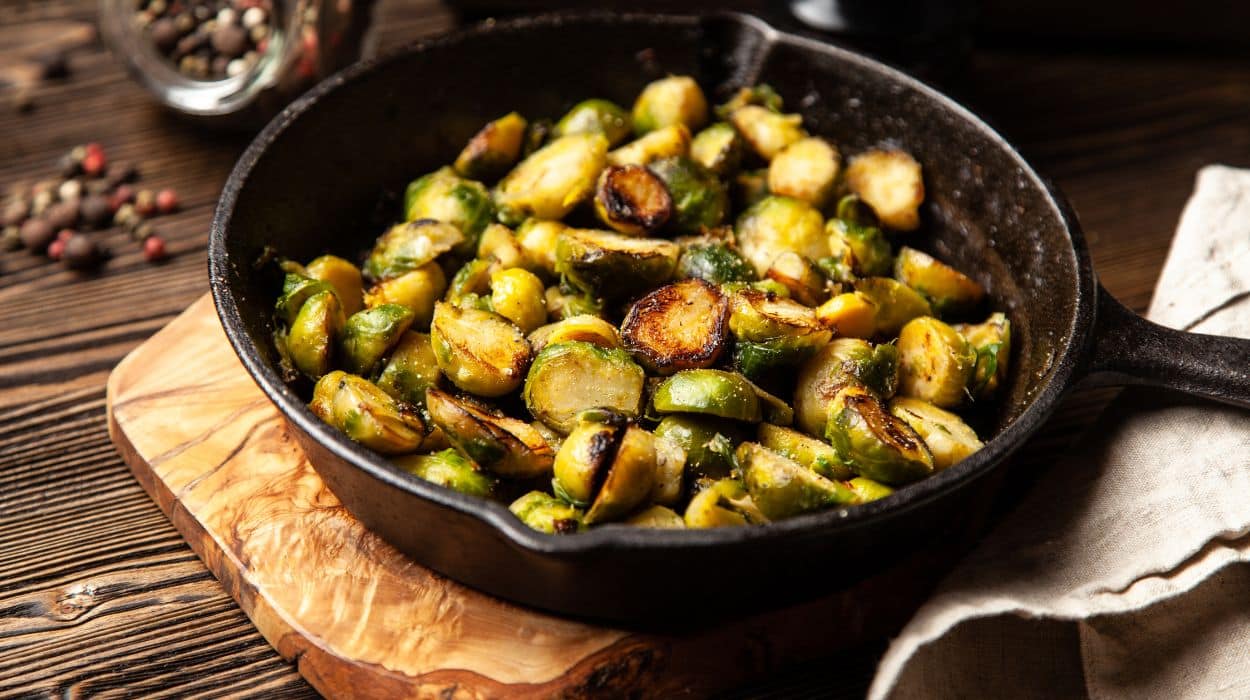Since they originated in Belgium, Brussels sprouts acquired the name from the country’s capital city, Brussels. Their appearance resembles cabbages; however, they are smaller. Despite looking like mini cabbages, there are numerous health benefits of Brussels sprouts. Brussels sprouts are among the top 20 most nutritious foods according to their Aggregate Nutrient Density Index score,[1] which measures vitamin, mineral, and phytonutrient contents in relation to caloric content. These plants are classified as kale, collard greens, cauliflower, broccoli, and other cruciferous vegetable families. Well-cooked Brussels sprouts have a sweet, mild, nutty flavor and are easy to cook.
Poorly cooked Brussels can result in a pungent sulfur-like smell, mushy texture, and bitter taste, therefore getting a bad reputation. When you prepare Brussels sprouts correctly, you can enjoy numerous health benefits from this low-calorie vegetable. Cruciferous vegetables are associated with numerous significant health benefits, including heart disease and cancer prevention. Brussels sprouts have phytochemicals[2] that contain anti-inflammatory and antioxidant properties.
This article will comprehensively review Brussels sprouts, including their fundamental nutritional facts, health benefits, how to eat or prepare, factors to consider when buying, and many more.
Benefits Of Brussel Sprouts
- Promoting Brain Health
- Promoting Bone Health
- Cancer Prevention
- Promoting Digestive Health
- Promoting Eye Health
- Promoting Immunity
- Promoting Cardiovascular Health
Benefits Of Brussels Sprouts

Brussels sprouts are high in minerals, vitamins, and fiber, offering various health benefits. These cruciferous vegetables contain bountiful amounts of vitamin C, vitamin K, vitamin A, fiber, omega-3 fatty acids, and so much more. This cruciferous vegetable consumption can improve your overall health and reduce the risk of suffering from certain chronic ailments such as cancer and diabetes. The following is a list of various health benefits obtained from this cruciferous vegetable consumption:
Promoting Brain Health
One of the most important health benefits of Brussels sprouts is that they help keep your brain healthy. Cruciferous vegetables are thought to help prevent brain diseases by making the brain work better and reducing inflammation. According to research, eating Brussels sprouts can help with depression and anxiety. Also, eating Brussels sprouts can improve your ability to move, learn, and remember. Brussels sprouts have a lot of vitamin K, which is known to help older people think more clearly.
Promoting Bone Health
Promoting bone health is one of Brussels sprouts’ most significant health benefits. These cruciferous vegetables contain vitamin K and calcium, among the building blocks of healthy bones. Bone health can be significantly enhanced by taking these cruciferous veggies; they lower the risk of bone destruction, fractures, and other musculoskeletal disorders.
Cancer Prevention
Cancer prevention[3] is one of the many health benefits of Brussels sprouts. As per the National Cancer Institute, these cruciferous vegetables can reduce the risk of pancreatic cancer. Brussels Sprouts are high in phytonutrients and vitamin C, which can reduce inflammation and cell protection, reducing cancer risk. These veggies also have glucosinolates, and sulfur-containing compounds, which can lower cancer risk[4] by preventing the growth of cancer cells and tumors.
Isothiocyanates,[5] which can be made from glucosinolates and are found in cruciferous vegetables like sprouts, and are being studied for their anticarcinogenic properties, such as their ability to stimulate phase I and phase II detoxification enzymes and block genes that cause tumors to grow.
Promoting Digestive Health
Research suggests that high fiber consumption can promote weight loss, reduce blood pressure, and promote insulin resistance. Brussels sprouts can support gut health since they contain bountiful fiber content. They can support digestive health by enhancing regular defecation hence getting rid of toxins that might cause ailments.
Promoting Eye Health
Promoting eye health[6] is one of the many health benefits of Brussels sprouts. These veggies can protect the eyes against cataracts and other degenerative eye disorders with the help of phytonutrients. Brussels sprouts are high in zeaxanthin, lutein, beta-carotene, and vitamin C, which have antioxidant properties that reduce inflammation.
Promoting Immunity
These cruciferous vegetables contain plenty of minerals and vitamins that support the immune system. Brussels Sprouts have antioxidant[7] properties that combat free radicals. Since the gut hosts a significant percentage of the immune system, the high fiber content in Brussels sprouts supports the gut microbiota. This promotes immunity, lowers inflammation, and elevates positive mood. Also, the presence of vitamin C in Brussels sprouts can help in the production of white blood cells, which combats free radicals.
Promoting Cardiovascular Health
Promoting cardiovascular health[8]: A report shows that there is a low accumulation of calcium in the aorta, the largest blood vessel of the heart, for people who frequently consume Brussels sprouts. These veggies are high in ALA (Alpha-linolenic acid), one of the most popular omega-3 fatty acids. This compound reduces inflammation, prevents blood clotting, and regulates the contraction and relaxation of the blood vessels. Vitamin K, vitamin C, and ALA might reduce the risk of heart disease.
Nutrition Facts Of Brussels Sprouts
There are many health benefits obtained from cooked or raw Brussels sprouts. One serving[9] of Brussels sprouts contains 43 calories, protein (3.38g), calcium (42mg), fiber (3.8 g), potassium (389 mg), iron (1.4g), vitamin K (177 μg), vitamin C (85 mg), Lutein + zeaxanthin (1590 μg), magnesium (23 mg), folate (61 μg ), phosphorus (69 mg), Beta Carotene (450 μg), vitamin C (85 mg), and vitamin A (754 IU ).
Brussels Sprouts are high in nutrients. These crunchy veggies are low in calories but contain bountiful minerals, vitamins, and fiber. Together these elements in Brussels can offer a variety of health benefits. For instance, Vitamin K[10] promotes bone health and is vital in blood clotting. Vitamin C[11] has antioxidant properties, boosts immune functions, and enhances iron absorption Fiber[12] supports digestive health and promotes heart health.[13] Brussels sprouts are high in antioxidant[14] agents that prevent cell damage. When you eat Brussels sprouts, the body can regulate blood sugar levels hence the lower risk of diabetes. Eating Brussels sprouts offers the body plenty of omega-3[14] fatty acids, reducing the risk of suffering from ailments related to the heart, brain, and immune system.
Adding Brussels sprouts to your meal is an excellent option for improving your health. You can add Brussels sprouts to your diet when baked, sauteed, or roasted and still enjoy numerous health benefits from these crunchy veggies. Fresh Brussels sprouts can be added to stir-fries, frittatas, pasta dishes, and other tasty nutritional meals. You can also use these veggies to make simple side dishes by mixing them with pepper, salt, and olive oil, then baking or roasting them till crispy.
Risks
Because Brussels sprouts have a lot of fiber, eating a lot of them may give you intestinal gases. This is because raffinose is in it. Raffinose is a fiber that is hard for your intestines to break down. This is a good way to remind yourself to chew your food well, which can help you digest it better.
As was already said, Brussels sprouts have a lot of vitamin K. This vitamin helps the blood stick together. Before you take more vitamin K, talk to your doctor if you take warfarin or other drugs that thin the blood.
Even if you try good recipes, there is always a chance that you won’t like the way Brussels sprouts taste or feel. When this is the case, supplements with superfood green powder make it easier to eat cruciferous vegetables.
In the same way, let’s look at some more ways to use Brussels in your meals.
Tips For Buying And Eating

Fresh or Frozen Brussels sprouts are available year-round at a variety of natural food retailers. Therefore, Brussels sprouts are a wonderful way to increase the vegetable content of your meals. Look for Brussels sprouts that are bright green and firm for the greatest quality. If the product has any yellow or black blotches, it is likely not fresh and consequently less nutritious. Brussels sprouts can be included in a variety of baking, sautéing, and roasting brussels sprouts recipes. Additionally, you can combine grated or raw Brussels sprouts with other crisp vegetables or a grilled kabob. Consumption of Brussels sprouts can be accompanied by stir-fries, frittatas, or pasta meals. The eating of Brussels sprouts might also be discussed with a nutritionist.
Raw Brussels sprouts are more nutritious than their cooked or boiled counterparts. These vegetables lose fiber and protein when heated. Furthermore, they have a harsh flavor when overcooked. When the appropriate procedures are followed, Brussels sprouts can be mixed into a delectable dish.
In addition, according to a certain study,[15] raw Brussels sprouts contain the most flavonoids overall. The highest levels of total carotenoids (0.35 mg/g) and chlorophylls (3.01 mg/g) are found in microwaved Brussels sprouts, followed by steamed and uncooked samples. The antioxidant activity of raw, fresh Brussels sprouts is the highest, followed by microwaved and steamed sprouts.
Conclusion
Brussels sprouts are a good addition to your diet because they are high in fiber, vitamins, minerals, and antioxidants.
They might also make your immune system stronger and reduce inflammation. Brussels sprouts are easy to cook and taste sweet, mild, and nutty when they are done right. If Brussels is not cooked well, it can have a sulfur-like smell, a mushy texture, and a strong taste, which gives it a bad name. When you cook Brussels sprouts right, you can get a number of health benefits from this low-calorie vegetable. Cruciferous vegetables are linked to many significant health benefits, such as lowering the risk of cancer and heart disease. Phytochemicals in Brussels sprouts help reduce inflammation and fight free radicals.
A well-balanced diet that includes Brussels sprouts and is high in fruits, vegetables, and whole grains could help your health a lot.
Frequently Asked Questions
Due to their high fiber content, eating a lot of Brussels sprouts may cause intestinal gas.
You can find these veggies in grocery stores. Always look for firm and bright green ones.
You can eat them raw, make salads, or add them to baked, sauteed, or roasting recipes.
Season them with pepper, salt, or olive oil, or serve them plain. You can also dress them with pepitas nuts, red pepper flakes, herbs, cheese, lemon juice, vinegar, and many more.
The best season to purchase stellar quality sprouts is late fall to early winter.
Yes. Brussels sprouts offer more nutritional value when eaten raw rather than cooked or boiled. Heat makes these veggies lose fiber and protein content.
They can boost immunity, eye, bone, heart, brain, and cancer prevention.
These vegetables increase the gut microbiota and, since they are high in fiber, therefore, prevent constipation.
 Expert's opinion
Expert's opinion
